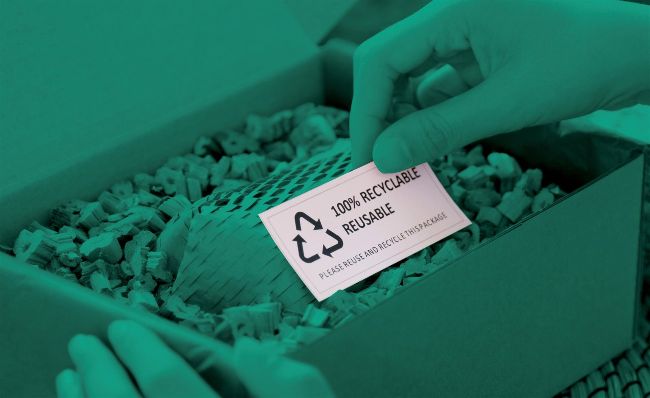SUSTAINABILITY PRACTICES FOR RETAILERS
For hunting and shooting retailers, adopting sustainable practices can not only enhance their reputation but also offer significant cost savings and long-term benefits. This article explores how retailers in this sector can integrate sustainability into their operations and communicate these efforts effectively to their customers.

IMAGE: SHUTTERSTOCK - CHAY_TEE
Key areas for implementing sustainable practices
1. Energy efficiency in retail operations
Reducing energy consumption is one of the easiest and most impactful ways for retailers to become more sustainable. Simple measures can include:
•
Switching to LED lighting: LED bulbs use significantly less energy and last longer than traditional lighting.
•
Installing smart energy management systems: These systems optimise heating, cooling, and lighting based on occupancy and time of day.
•
Utilising renewable energy: Where feasible, installing solar panels or switching to green energy suppliers can significantly reduce a retailer’s carbon footprint.
Highlighting energy-efficient measures in-store, such as signage about renewable energy use, reinforces the message to customers that your business is committed to sustainability.
2. Sustainable product sourcing
Retailers can play a critical role in promoting environmentally friendly products. This includes:
•
Stocking eco-friendly ammunition: Lead-free ammunition reduces environmental contamination.
•
Promoting sustainable apparel: Carrying hunting gear made from recycled materials or produced through sustainable practices.
•
Highlighting eco-conscious brands: Many manufacturers now focus on reducing their environmental impact; partnering with such brands demonstrates alignment with modern consumer values.
When promoting these products, retailers should provide clear labelling and information to educate customers about the environmental benefits of their purchases.
Waste reduction initiatives
Waste reduction is a cornerstone of sustainability, offering significant environmental and financial benefits for hunting and shooting retailers. By implementing targeted waste reduction strategies, retailers can minimise their environmental footprint, reduce operational costs, and position their business as eco-conscious leaders in the industry. The following initiatives provide practical ways to achieve these goals.
1. Minimising packaging waste
Packaging waste is a significant contributor to environmental pollution, particularly when plastic is involved. Retailers can address this issue by:
•
Choosing sustainable suppliers: Collaborate with suppliers that use biodegradable, compostable, or minimal packaging. For example, sourcing products that come in recycled or recyclable packaging can drastically reduce waste.
•
Encouraging reusable options: Offer incentives for customers to bring their own reusable bags or containers. Many businesses now provide discounts or loyalty points for customers who opt for reusable packaging, aligning cost-saving initiatives with waste reduction goals.
•
Implementing bulk product displays: For certain items, consider bulk purchasing and allowing customers to refill their own containers. This approach not only eliminates packaging waste but also offers customers a cost-effective shopping option.
2. Establishing recycling programmes
Recycling is an effective way to manage waste responsibly, but it requires active participation and accessibility. Retailers can foster a culture of recycling through:
•
In-store recycling bins: Place clearly labelled recycling bins for items such as spent cartridges, cardboard, and plastics. Educate customers on what can be recycled and ensure regular collection by partnering with local recycling companies.
•
Specialised recycling initiatives: Work with manufacturers or environmental organisations to recycle hard-to-dispose -of items like old optics, used firearm components, or worn-out hunting gear. Some organisations even offer collection schemes for these items, which can enhance customer loyalty by offering a convenient disposal option.
•
Upcycling projects: Promote upcycling by collecting materials like wood, leather, or fabric scraps and donating them to local artisans or hobbyists. This not only diverts waste from landfills but also supports local creativity and businesses.
3. Embracing digital solutions
Transitioning to digital systems can significantly reduce paper waste and streamline operations. Key measures include:
•
Digital receipts: Offer customers the option of receiving receipts via email or SMS. This not only reduces paper usage but also provides an opportunity to engage with customers digitally, such as by including links to promotions or loyalty programmes.
•
Paperless marketing: Shift promotional efforts to email, social media, and digital advertisements. Digital platforms allow for more precise targeting, tracking, and analytics compared to traditional paper-based methods like flyers and mailers.
•
Cloud-based inventory and record keeping: Replace paper-heavy processes such as inventory tracking or record keeping with digital systems. These systems not only reduce waste but also improve operational efficiency and accessibility.
4. Engaging customers in waste reduction
Retailers can foster greater impact by involving customers in their waste reduction efforts. Ideas include:
•
Loyalty programmes for recycling: Reward customers who participate in recycling initiatives, such as returning used cartridges or old gear for proper disposal.
•
Education and awareness: Host workshops or create informative displays about the environmental impact of waste and how customers can contribute to reduction efforts.
•
Reusable merchandise: Sell branded reusable items such as tote bags, water bottles, or coffee cups. These products not only reduce waste but also serve as marketing tools that reinforce your store’s sustainability message.
Sustainable store design
1. Eco-friendly building materials
The choice of building materials can have a substantial impact on a store’s environmental footprint. Opting for reclaimed wood, recycled steel, and low-emission paints not only conserves resources but also reduces harmful emissions during construction. These materials often have a unique aesthetic, giving the store a distinctive character that sets it apart from competitors.
2. Efficient water use
Water conservation should be a priority in sustainable store design. Low-flow faucets, dual-flush toilets, and water recycling systems help minimise water usage and reduce utility bills. Retailers can go a step further by installing rainwater harvesting systems to collect and reuse water for landscaping or non-potable purposes.
3. Maximising natural lighting
Strategic use of natural light reduces reliance on artificial lighting, lowering energy consumption while creating a welcoming and vibrant shopping environment. Skylights, large windows, and reflective interior surfaces can enhance natural illumination.
4. Energy-efficient infrastructure
Incorporating energy-efficient technologies into the store’s design is another vital aspect of sustainability. High-performance insulation, energy-efficient HVAC systems, and smart energy management solutions can significantly reduce a building’s energy needs.
5. Sustainable landscaping
If the store has outdoor space, sustainable landscaping can complement the building’s eco-friendly design. Using native plants that require minimal water and maintenance is an environmentally responsible choice. Green roofs or vertical gardens not only improve aesthetics but also provide insulation, reduce urban heat island effects, and enhance air quality.
6. Circular design principles
Sustainability can also be applied through circular design principles, which prioritise the reuse and repurposing of materials. For instance, fixtures from old stores can be refurbished and incorporated into the new design, reducing waste and conserving resources. Retailers can also partner with manufacturers to create modular fixtures that are easier to disassemble and recycle when no longer needed.
Sustainable hunting and shooting practices Retailers can educate and influence customers by promoting sustainable practices in hunting and shooting. This includes:
•
Encouraging ethical hunting: Highlighting resources and tools that promote sustainable hunting, such as accurate riflescopes and rangefinders that reduce the likelihood of wounding animals.

IMAGE: SHUTTERSTOCK - SVITLINI
•
Supporting habitat restoration: Partnering with local conservation organisations or donating a portion of profits to habitat restoration projects.
•
Reducing single-use plastics in the field: Promoting reusable items such as water bottles, game bags, and camping equipment.
By positioning your store as a hub for sustainable hunting education, you can foster customer loyalty while contributing to conservation efforts.
Communicating sustainability to customers
Adopting sustainable practices is only part of the equation. Effectively communicating these efforts to customers is crucial to reap the reputational benefits. Here’s how to do it:
1. Storytelling
Share the story behind your sustainability initiatives. Whether it’s switching to renewable energy or partnering with eco-friendly suppliers, explaining the rationale and benefits adds authenticity and depth to your efforts.
2. In-store signage and displays
Use displays to highlight sustainable products and practices. For example, create a section in your store dedicated to environmentally friendly products or use signage to explain energy-saving measures.
3. Digital engagement
Use your website and social media platforms to promote sustainability. Blog posts, videos, and infographics showcasing your initiatives can engage customers and encourage them to share your message. For instance, a behindthe-scenes video of your store’s solar panel installation can generate significant interest.
4. Involving customers
Encourage customer participation through initiatives like recycling schemes or loyalty programmes that reward eco-friendly purchases. Engaging customers directly reinforces their role in supporting sustainable retail. Overcoming challenges Implementing sustainable practices can be challenging, particularly for smaller retailers. Common hurdles include upfront costs, lack of resources, or scepticism from stakeholders. However, these can be addressed with the following strategies:
•
Start small: Implement low-cost changes first, such as reducing paper use or switching to energy-efficient lighting.
•
Seek funding: Many governments and organisations offer grants or incentives for sustainability projects, such as installing renewable energy systems.
•
Educate staff: Ensure your team understands the importance of sustainability and can articulate your efforts to customers confidently.
•
Monitor progress: Use metrics to track the effectiveness of your initiatives and identify areas for improvement.
The business case for sustainability
Sustainability isn’t just good for the planet; it’s also an essential component of a successful and resilient business strategy. For hunting and shooting retailers, embracing sustainability offers several tangible benefits that can enhance profitability, customer relationships, and future-proofing against market changes.
1. Cost savings
Sustainability often begins with energy efficiency and waste reduction, both of which have immediate cost-saving implications. For example, switching to LED lighting can reduce electricity bills by up to 75%, and minimising packaging waste can lower material and disposal costs. Over time, investments in renewable energy, such as solar panels, can lead to significant savings, as these systems often pay for themselves within a few years.
2. Customer loyalty
Today’s consumers are increasingly aware of their environmental impact and prefer to support businesses that align with their values. Hunting and shooting retailers that prioritise sustainability demonstrate a commitment to preserving the very habitats and wildlife their customers value. This alignment fosters deeper customer trust and loyalty.
3. Brand differentiation
In a competitive marketplace, standing out is critical. By being an early adopter of sustainability practices, hunting and shooting retailers can position themselves as leaders in their industry. This differentiation is particularly valuable as sustainability moves from being a niche concern to a mainstream expectation. Businesses that champion environmental stewardship not only appeal to environmentally conscious customers but also attract partnerships with like-minded suppliers and manufacturers, further enhancing their market position.
4. Regulatory compliance
Governments worldwide are implementing stricter environmental regulations to combat climate change and promote resource efficiency. For example, laws targeting single-use plastics, emissions reductions, and energy efficiency are becoming more common. Retailers that adopt sustainable practices now are better equipped to meet these regulations, avoiding potential fines or disruptions.
5. Employee engagement and recruitment
Sustainability efforts can also improve employee satisfaction and attract top talent. Many employees prefer to work for companies that share their values, particularly younger generations who prioritise environmental and social responsibility. By adopting sustainable practices, businesses create a workplace culture that fosters pride and engagement, leading to higher productivity and retention rates.
We’d love to hear your thoughts on the topics discussed in this article. Please send your comments to editorial@twsgroup.com